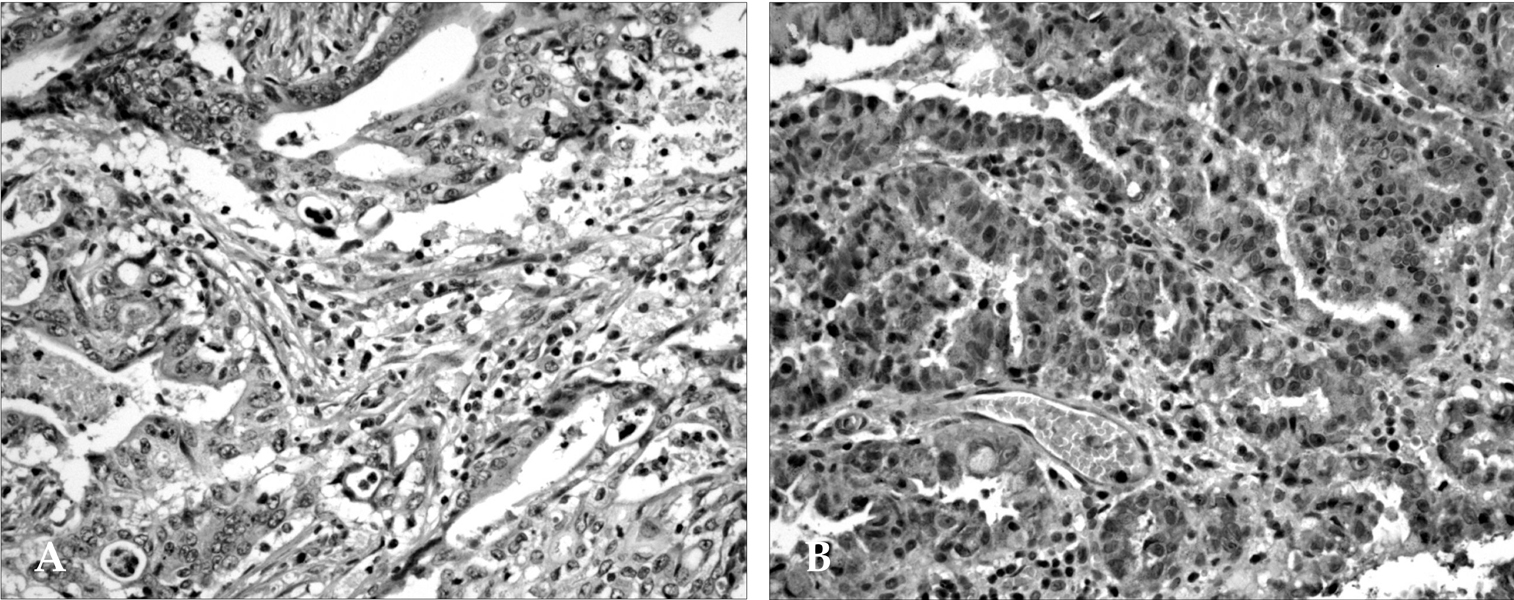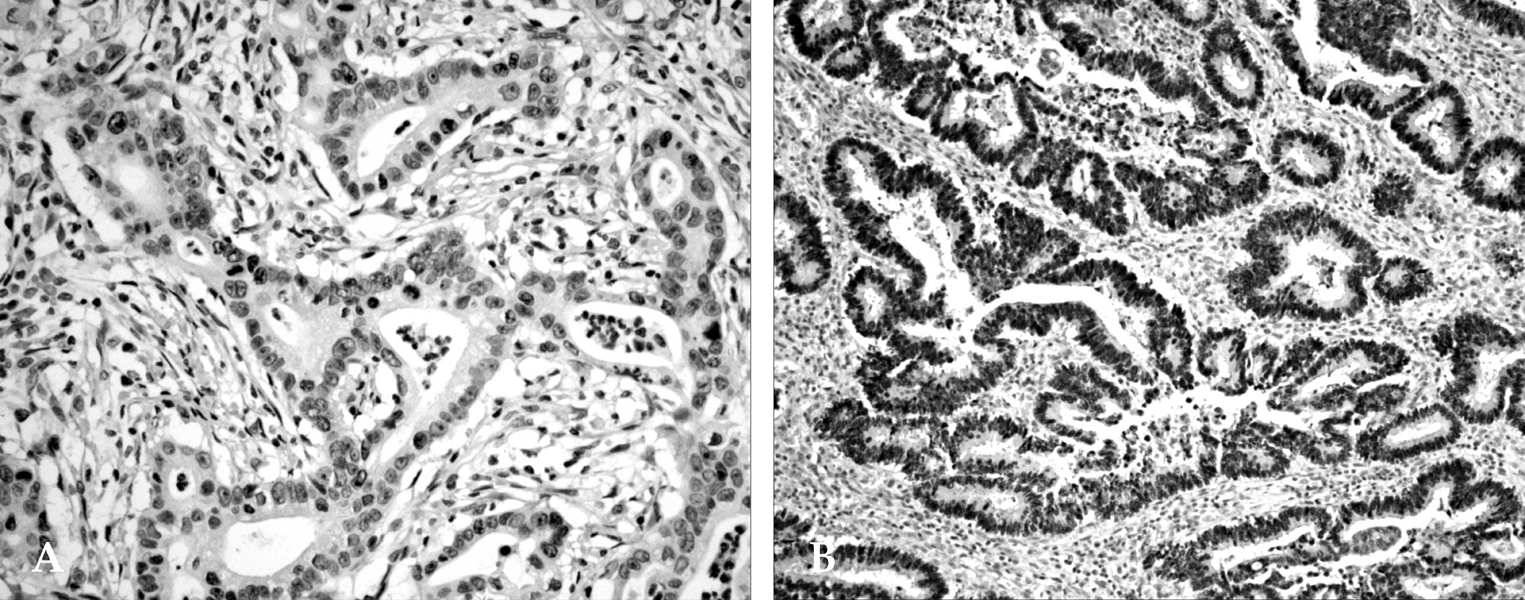Yonsei Med J.
2007 Jun;48(3):495-501. 10.3349/ymj.2007.48.3.495.
Expression of Cyclooxygenase-2 and its Relationship to p53 Accumulation in Colorectal Cancers
- Affiliations
-
- 1Research Center for Resistant Cells, Chosun University College of Medicine, Gwangju, Korea.
- 2Department of Preventive Medicine, Chosun University College of Medicine, Gwangju, Korea.
- 3Department of Surgery, Chosun University College of Medicine, Gwangju, Korea. kjkim@chosun.ac.kr
- KMID: 724106
- DOI: http://doi.org/10.3349/ymj.2007.48.3.495
Abstract
- PURPOSE
Cyclooxygenase (COX)-2 is an inducible isoform responsive to cytokines, mitogens, and growth factors, and is believed to be an important enzyme related to colorectal cancer (CRC). Existing evidence suggests that COX-2 expression is normally suppressed by wild-type p53 but not mutant p53, suggesting that loss of p53 function may result in the induction of COX-2 expression. The aim of this study was to determine the relationship between COX-2 expression and p53 levels in CRC. MATERIALS AND METHODS: Patients with sporadic colorectal adenocarcinoma (n=161) who underwent curative surgery in Chosun University Hospital were enrolled in this study. Expression of COX-2 and p53 proteins was examined by immunohistochemistry in paraffin-embedded cancer tissue blocks, and the relationship between COX-2 and/or p53 expression with clinicopathologic parameters was analyzed. RESUTLS: Expression of COX- 2 was positive in 47.8% of colorectal cancers, and significantly associated with the depth of tumor invasion (p= 0.042). In contrast, p53 was positive in 50.3% of the cases, and was associated with both age (p=0.025) and the depth of tumor invasion (p=0.014). There was no correlation between COX-2 expression and p53 expression (p=0.118). CONCLUSION: These results suggest that COX-2 expression might play an important role in the progression of colorectal cancer. However, COX-2 expression was not associated with mutational p53. Further studies are needed to clarify the regulatory mechanisms governing COX-2 overexpression in colorectal cancers.
Keyword
MeSH Terms
Figure
Reference
-
1. Boyle P, Zaridze DG, Smans M. Descriptive epidemiology of colorectal cancer. Int J Cancer. 1985. 36:9–18.
Article2. Annual Report of the Korea Central Cancer Registry 2002. 2002. Ministry of Health and Welfare Republic of Korea.3. Fearon ER, Vogelstein B. A genetic model for colorectal tumorigenesis. Cell. 1990. 61:759–767.
Article4. Williams CS, Mann M, DuBois RN. The role of cyclooxygenases in inflammation, cancer, and development. Oncogene. 1999. 18:7908–7916.
Article5. Kujubu DA, Fletcher BS, Varnum BC, Lim RW, Herschman HR. TIS10, a phorbol ester tumor promoter-inducible mRNA from Swiss 3T3 cells, encodes a novel prostaglandin synthase/cyclooxygenase homologue. J Biol Chem. 1991. 266:12866–12872.
Article6. Subbaramaiah K, Dannenberg AJ. Cyclooxygenase2: a molecular target for cancer prevention and treatment. Trends Pharmacol Sci. 2003. 24:96–102.7. Subbaramaiah K, Altorki N, Chung WJ, Mestre JR, Sampat A, Dannenberg AJ. Inhibition of cyclooxygenase-2 gene expression by p53. J Biol Chem. 1999. 274:10911–10915.
Article8. Remmele W, Stegner HE. Recommendation for uniform definition of an immunoreactive score (IRS) for immunohistochemical estrogen receptor detection (ER-ICA) in breast cancer tissue. Pathologe. 1987. 8:138–140.9. Yamauchi T, Watanabe M, Kubota T, Hasegawa H, Ishii Y, Endo T, et al. Cyclooxygenase-2 expression as a new marker for patients with colorectal cancer. Dis Colon Rectum. 2002. 45:98–103.
Article10. Xiong B, Sun TJ, Hu WD, Cheng FL, Mao M, Zhou YF. Expression of cyclooxygenase-2 in colorectal cancer and its clinical significance. World J Gastroenterol. 2005. 11:1105–1108.
Article11. Soumaoro LT, Uetake H, Higuchi T, Takagi Y, Enomoto M, Sugihara K. Cyclooxygenase-2 expression: a significant prognostic indicator for patients with colorectal cancer. Clin Cancer Res. 2004. 10:8465–8471.12. Konno H, Baba M, Shoji T, Ohta M, Suzuki S, Nakamura S. Cyclooxygenase-2 expression correlates with uPAR levels and is responsible for poor prognosis of colorectal cancer. Clin Exp Metastasis. 2002. 19:527–534.13. Masunaga R, Kohno H, Dhar DK, Ohno S, Shibakita M, Kinugasa S, et al. Cyclooxygenase-2 expression correlates with tumor neovascularization and prognosis in human colorectal carcinoma patients. Clin Cancer Res. 2000. 6:4064–4068.14. Tomozawa S, Tsuno NH, Sunami E, Hatano K, Kitayama J, Osada T, et al. Cyclooxygenase-2 overexpression correlates with tumor recurrence, especially haematogenous metastasis, of colorectal cancer. Br J Cancer. 2000. 83:324–328.
Article15. Le Voyer TE, Sigurdson ER, Hanlon AL, Mayer RJ, Macdonald JS, Catalano PJ, et al. Colon cancer survival is associated with increasing number of lymph nodes analyzed: a secondary survey of intergroup trial INT-0089. J Clin Oncol. 2003. 21:2912–2919.
Article16. Soumaoro LT, Uetake H, Takagi Y, Iida S, Higuchi T, Yasuno M, et al. Coexpression of VEGF-C and Cox-2 in human colorectal cancer and its association with lymph node metastasis. Dis Colon Rectum. 2006. 49:392–398.
Article17. Bargonetti J, Manfredi JJ. Multiple roles of the tumor suppressor p53. Curr Opin Oncol. 2002. 14:86–91.
Article18. Levine AJ, Momand J, Finlay CA. The p53 tumor suppressor gene. Nature. 1991. 351:453–456.19. Harris CC, Hollstein M. Clinical implications of the p53 tumor suppressor gene. N Engl J Med. 1993. 329:1318–1327.
Article20. Cressey R, Pimpa S, Tontrong W, Watananupong O, Leartprasertsuke N. Expression of cyclooxygenase-2 in colorectal adenocarcinoma is associated with p53 accumulation and hdm2 overexpression. Cancer Lett. 2006. 233:232–239.
Article21. Sakuma K, Fujimori T, Hirabayashi K, Terano A. Cyclooxygenase (COX)-2 immunoreactivity and relationship to p53 and Ki-67 expression in colorectal cancer. J Gastroenterol. 1999. 34:189–194.
Article22. Liang JT, Huang KC, Jeng YM, Lee PH, Lai HS, Hsu HC. Microvessel density, cyclo-oxygenase 2 expression, K-ras mutation and p53 overexpression in colonic cancer. Br J Surg. 2004. 91:355–361.
Article
- Full Text Links
- Actions
-
Cited
- CITED
-
- Close
- Share
- Similar articles
-
- Expression of p53 Protein in Colorectal Carcinoma: Comparison with PCNA reactivity
- Expression of Cyclooxygenase-2 and Tumor Microvessel Density in Colorectal Cancer
- Comparison of cyclooxygenase-2 and p53 expression in normal endometrium, endometrial hyperplasia and endometrial cancer
- The Study of p53 Expression and DNA Ploidy in Colorectal Carcinoma
- Prognostic Significance of the Expression of MRP and p53 in Colorectal Carcinoma



